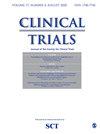剂量测定设计中的当前问题:对美国食品和药物管理局肿瘤卓越中心项目 optimus 的回应
IF 2.2
3区 医学
Q3 MEDICINE, RESEARCH & EXPERIMENTAL
引用次数: 0
摘要
随着靶向药物和免疫疗法的出现,医学研究界越来越意识到,传统的方法不足以确定新药的最佳剂量或疗程。传统的 I 期设计无法可靠地确定安全有效的剂量,这一点已得到充分证实。这个问题一般适用于细胞毒药物、放射治疗、靶向药物和免疫疗法。为了解决这个问题,美国食品药品管理局肿瘤卓越中心启动了 Optimus 项目,目标是 "改革肿瘤药物开发中的剂量优化和剂量选择模式"。作为对 Optimus 项目的回应,本期《临床试验》特刊的文章回顾了新药剂量或疗程选择方法的最新进展,总体目标是向临床试验人员介绍这些创新设计。这篇介绍性文章简要回顾了传统方法存在的问题、鼓励更好的剂量优化设计的法规变化,并对本特刊后续文章进行了简要概述。本文章由计算机程序翻译,如有差异,请以英文原文为准。
Current issues in dose-finding designs: A response to the US Food and Drug Adminstrations’s oncology center of excellence project optimus
With the advent of targeted agents and immunological therapies, the medical research community has become increasingly aware that conventional methods for determining the best dose or schedule of a new agent are inadequate. It has been well established that conventional phase I designs cannot reliably identify safe and effective doses. This problem applies, generally, for cytotoxic agents, radiation therapy, targeted agents, and immunotherapies. To address this, the US Food and Drug Administration’s Oncology Center of Excellence initiated Project Optimus, with the goal “to reform the dose optimization and dose selection paradigm in oncology drug development.” As a response to Project Optimus, the articles in this special issue of Clinical Trials review recent advances in methods for choosing the dose or schedule of a new agent with an overall objective of informing clinical trialists of these innovative designs. This introductory article briefly reviews problems with conventional methods, the regulatory changes that encourage better dose optimization designs, and provides brief summaries of the articles that follow in this special issue.
求助全文
通过发布文献求助,成功后即可免费获取论文全文。
去求助
来源期刊

Clinical Trials
医学-医学:研究与实验
CiteScore
4.10
自引率
3.70%
发文量
82
审稿时长
6-12 weeks
期刊介绍:
Clinical Trials is dedicated to advancing knowledge on the design and conduct of clinical trials related research methodologies. Covering the design, conduct, analysis, synthesis and evaluation of key methodologies, the journal remains on the cusp of the latest topics, including ethics, regulation and policy impact.
 求助内容:
求助内容: 应助结果提醒方式:
应助结果提醒方式:


